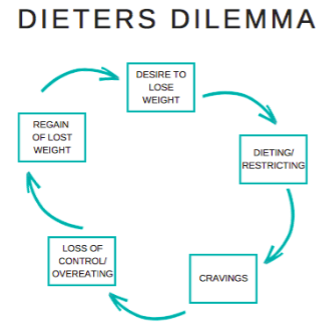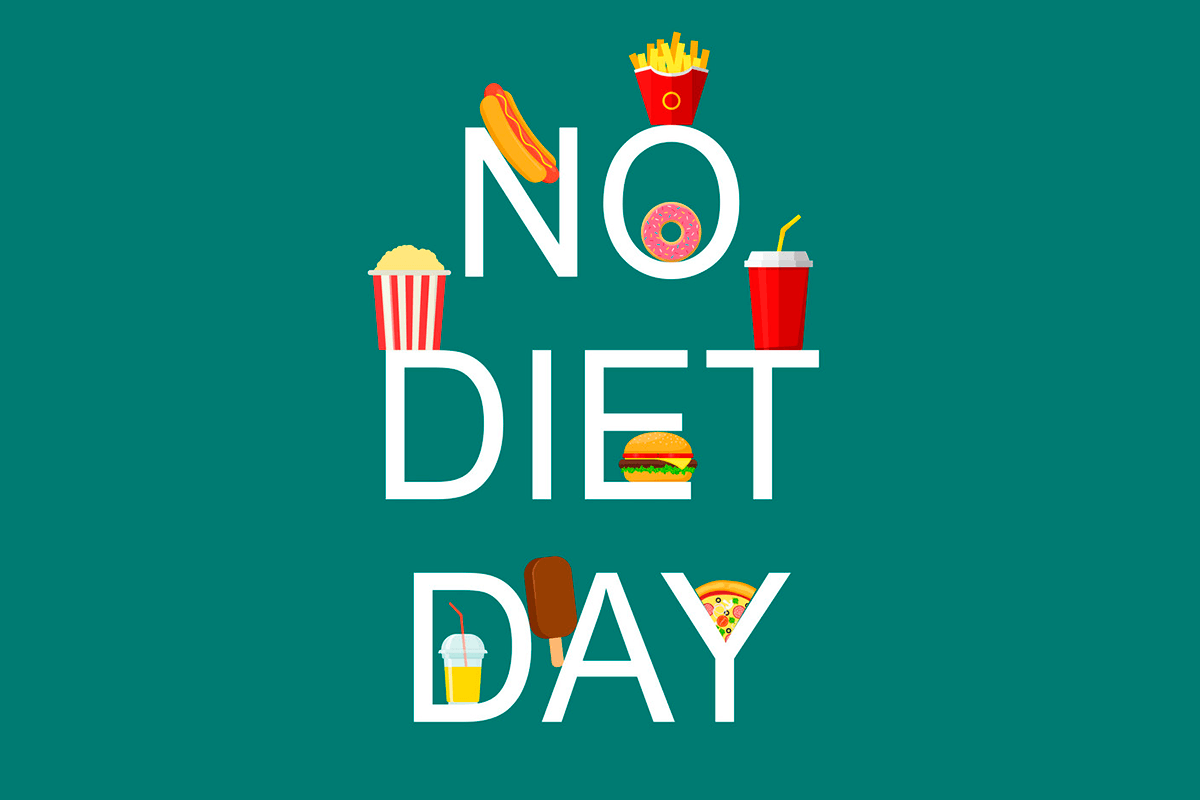May 6 is International No Diet Day. It was started by British feminist Mary Evans Young who battled body image issues for years. In 1992, after seeing other women experience similar struggles to her, she took action to create a day dedicated to promoting a healthy lifestyle. She focused on raising awareness of the potential dangers of dieting while sharing the messages of the Health at Every Size movement (to learn more about the research behind HAES I highly recommend the original book by Linda Bacon).
First, it is important to recognize that if we all ate the same thing and exercised the same way we would all still be different shapes and sizes. Body diversity is normal and therefore should be respected and celebrated. Health at every size does not mean “healthy at every size”. Instead, it means that people can be healthy at a range of sizes and that body diversity exists. Additionally, body diversity acknowledges the harm of weight stigma to health and supports that people of all sizes deserve respectful access to healthcare.
Here are Beckon’s top 3 reasons why diets and a weight-normative approach to health are often more harmful than helpful for both our physical and mental health.
- Diets Give Us a False Sense of Control and Distract us From More Important Things in Life.
Dieting gives us an illusion of control and for many giving up that sense of control can be scary. However, its important to note that we have far less control over our weight than diet proponents make us think.
Those who promote diets don’t want us to know that there is something called a “set point”, in which the human body is able to adapt to situations of excess or insufficient energy intake (food). The “set point” is a reference point around which the body tries to keep a weight stable. Each individual may have a genetically determined set point for adult weight.
Our set point can be compared to the homeostasis in our bodies when it comes to body temperature. For example, if our temperature goes above or below 98.6 F due to an infection, there are a variety of physical mechanisms that “kick in” to try to get back to, and maintain normal body temperature.
How does set point work? If weight is gained some people may experience an increase in metabolism so that excess energy is wasted. Following this period of weight gain, it is relatively easy to return to the previous set point weight.
However, when attempting to go below the set point, weight has the opposite effect and can lead to a slow down in metabolism. This leads to a plateau in weight loss, or even in some cases the regaining of weight. This is your body’s attempt to keep your weight stable. Aside from the false perception that dieting provides when it comes to control, it also serves as a distraction from more important things in life.
Young felt inspired to establish the holiday after overhearing coworkers debate whether or not to eat a cookie at the office. She approached them and famously said, “What do you think would happen if you spent as much time and energy on your careers as you do on diets?” Ditching diets can free up so much more mental space for other important things in life.
- 95% of Diets Fail and Lead to More Weight Gain in the Long Run
Research shows that 95% of people who diet end up gaining the weight that they lost back. Of that 95%, 2/3 will end up gaining more weight than what they started out at. This often leads to a vicious yo-yo dieting cycle (see the image below which depicts this scenario). A team of ULCA researchers reviewed over 30 studies on dieting in this study in 2007 and found that dieting is actually a predictor of weight gain. Another study in 2003 looked at nearly 17,000 kids ages 9-14 and concluded the same.

The literature shows us that yo-yoing aka weight cycling (losing weight–> gaining weight–>repeat) is actually more harmful to our health than just staying at a higher weight. For example, in addition to weight gain after dieting in the long-term, another study also found that weight cycling may lead to increased risk for cardiovascular and metabolic disorders (such as hypertension and diabetes).
Evelyn Tribole and Elyse Resch said it best in their book Intuitive Eating: “If dieting programs had to stand up to the same scrutiny as medications, they would never be allowed for public consumption. Imagine for an asthma medication improves your breathing for a few weeks, but in the long run, causes your lungs and breathing to worsen”.
- Diets are Not Only Harmful for Our Physical Health, but Our Mental Health too.
When the weight is re-gained, the individual may feel like a failure for not losing enough weight or being unable to control their weight. Feelings of guilt and shame are common and can lead to disordered eating behaviors. Although dieting may not be the cause of eating disorders, it does put someone at risk for developing one.
A person with disordered eating behaviors may isolate themselves for fear of socializing in situations that involve food, and this isolation may contribute to low self-esteem and significant emotional distress as well.
If not dieting… then what?
First off… think about *WHY* you are dieting and/or seeking weight loss in the first place…
The most frequent answers to this question includes the following goals:
- Improved health
- Enhanced energy
- Increased confidence
The thing is… in order to achieve the above dieting/ intentional weight loss isn’t necessary and may even be providing you with the OPPOSITE results. Instead, you can achieve your goals by putting your focus on making healthy lifestyle changes and taking the focus off of weight.
For those with a chronic history of dieting… the first step out of this cycle is leave the diet mentality behind. This takes work and doesn’t happen overnight, but by gaining awareness and putting in the work you can achieve your health goals without dieting.
But how? Diet culture everywhere… The authors of the book Intuitive Eating suggest “throwing out the diet books and magazine articles that offer you false hope of losing weight quickly, easily, and permanently.” They recommend “getting angry at the lies that led you to feel as if you were a failure every time a new diet stopped working and you gained all the weight back.”
Embrace Intuitive Eating
After unlearning diet culture, it can be helpful to continue to learn about the other principles of Intuitive Eating such as honoring your hunger, making peace with food, challenging the food police and discovering the satisfaction factor. Reading the original book is a great place to start. They also have a wonderful companion workbook. If you feel you need more one on one help to assist you in breaking the diet cycle there are also Dietitians and Therapists trained in Intuitive Eating and Health at Every Size that would be able to offer you beneficial 1:1 support.
Rebecca Ditkoff, MPH, RDN, CDN is a Registered Dietitian and Certified Intuitive Eating Counselor specializing in digestive health and disordered eating. Her non-diet approach to nutrition is rooted in the theories of Intuitive Eating and Health at Every Size (HAES) in which she emphasizes self-care over rigid diet rules and restriction. She is the founder of Nutrition by RD, a brand dedicated to helping people improve their relationship with food and their bodies. Rebecca also runs a virtual nutrition counseling practice from New York, NY where she works with clients one-on-one providing personalized nutrition counseling. She has been featured in a number of publications including: Women’s Health, Prevention, Forbes, Real Simple, The Huffington Post, and many more. Rebecca enjoys traveling, live music, daily trips to the dog park with her Chihuahua-mix named Winnie, and experimenting with new recipes in the kitchen.






